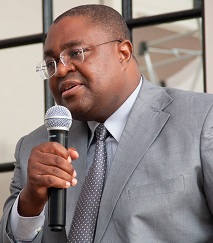
Institutional Investors Forum in Swakopmund concludes – Economic growth through alternative investments discussed

Last week, various decision-makers in the government and private sectors assembled at the Namibia Institutional Investors Forum at Strand Hotel, Swakopmund, to discuss economic growth through alternative investments.
Michael Ndinisa, CEO and host of MN Capital Group’s Forum, represents an investment communication and institutional business development firm that specializes in providing institutional incentives to companies developing, including front corporations, as well as government, retirement benefits, and foreign funds.
This two-day Namibia Institutional Investment Forum 2022, themed ‘Harnessing Alternative Investment to Drive Economic Recovery,’ welcomed close to 100 top investment professionals from Namibia and internationally.
The programme focused on policymakers and regulators who have a direct impact on pension funds, insurance firms, development financial institutions, and individual investors.
Some guest speakers present included; Bishop Joshua Maponga Founder & CEO of Farmers of Thought Institute, Kenneth Matomola, CEO of NAMFISA, Tiaan Bazuin, CEO of Namibian Stock Exchange, CEO Development Bank of Namibia Martin Inkumbi, Presidential Economic Advisor, James Mnyupe and countless more delegates of reputable companies.
Hileni Nghinaunye, Portfolio Manager at Mergence Unlisted Investment Managers (Namibia), who was also the main sponsor at this years’ event recapped saying that the Forum was an informative and
productive set of days.
“The presenters were relevant to this year and what it holds for us. As an asset manager, I would like to see different parties, not only focusing on the update of their career but combating the industry’s regulatory issues at hand, be addressed and strategized. We should interrogate these issues and recap on the funding gap from the speaker of The Development Bank of Namibia or GIPF as an example, between the greenfield & brownfield types of transactions and the tapping in of SME financing. The challenge is that the current investors, trustees, institutional investors and pension funders don’t have an appetite for that greenfield, so we need to come up with a workable model to close this gap and the best way is to speak to an institutional investor and have trustees on stage to explain their willingness of risk-taking and how far they’d run the mile to allocate capital to this type of asset class,” she highlighted.
Throughout the two-day discussion, strategies were shared on how industries can work together with regulators to come up with well-managed equity SME funds for Namibia.
Bishop Joshua brought a disruptive and thought-provoking speech on ensuring that the economy starts updating its software, being mindful of its resources and upgrading its relevance to laws and policies that were created in an outdated era.
James Mnyupe illustrated government plans around its green hydrogen initiatives and mentioned that Namibia has experienced a spike in investment leads, primarily in green hydrogen, with additional leads indicating interest in agriculture and tourism. This demonstrates Namibia’s development and future investment prospects, which are in line with the Sustainable Development Goals, a topic that will surely see a future at the next forum to look into the role of investment and asset managers that encourage asset owners to focus on alternatives, with potentially higher returns as well as asset classes delivering superior returns in Namibia.
The upcoming forum is set to be held in Mauritius in May 2022. More information on registrations can be obtained through the Director, Michael Ndinisa through email; [email protected].











































